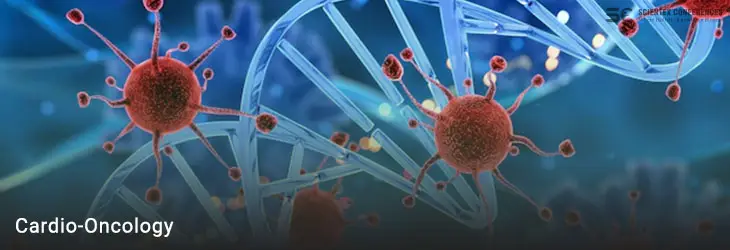Track: Cardio Oncology

Cardio-Oncology is the branch of cardiology, is concerned with the early detection, continued monitoring, and therapeutic management of cardiovascular problems brought on by chemotherapeutic and radiotherapeutic side effects. Both cancer therapy options have the potential to cause cardiovascular dysfunction, a major cause of morbidity and mortality in the oncologic population. This field deals with the interaction of cardiologists, oncologists and other practitioners in order to provide complete care to a cancer patient including their cardiovascular health.
Cardiovascular Complications from Cancer Therapies:
- Chemotherapy-Induced Cardiotoxicity: Certain medications, such as HER2 inhibitors (such as trastuzumab) and anthracyclines (such as doxorubicin), can result in heart failure and diminished left ventricular function.
- Radiation-Induced Heart Disease: Arrhythmias, pericarditis, valvular heart disease, and coronary artery disease can all result from radiation therapy administered to the chest.
- Immunotherapies and targeted therapies: Immuno check point inhibitors and tyrosine kinase inhibitors are examples of novel medicines that come with hazards like thrombosis, hypertension, and myocarditis.
Emerging Research and Future Directions:
- Cardiovascular Toxicity of Cancer Therapies
- Cardiac Imaging in Oncology Patients
- Biomarkers for Cardiotoxicity
- Cardiac Care During Cancer Treatment
- Survivorship and Long-Term Cardiovascular Health
- Cardiovascular Risk Assessment in Cancer Patients
- Role of Cardio-Oncology Clinics
- Advanced Imaging Techniques
- Pharmacological Interventions
- Personalized Medicine
- Radiation-Induced Heart Disease
- Targeted Therapies and Cardiovascular Effects
- Role of Exercise and Rehabilitation
- Cardiac Surgery in Oncology Patients
- Cardiac Neoplasms
- Fetal Heart Tumor
The Cardio-Oncology session will explore the intersection of cardiovascular health and cancer treatment, highlighting the latest research and clinical advancements in this rapidly evolving field. This session serves as a platform for sharing insights that address the complex challenges faced by both patients and clinicians. Abstract submission offers a meaningful opportunity to participate in and engage with this critical discourse to all those wishing to contribute. Participation in these discussions can significantly influence the future of cardio-oncology care.
Scientific Highlights
- Cardiovascular Diseases
- Cardio Oncology
- Pediatric Cardiology & Congenital Heart Diseases
- Thoracic and Cardiovascular Surgery
- Hypertension and Cardiac Regeneration
- Interventional Cardiology and Cardiac Imaging
- Women and Fetal Cardiology
- Diabetes, Obesity and Stroke
- Vascular Surgery and Vascular Biology
- Molecular and Geriatric Cardiology
- Cardiac Nursing and Critical Care Cardiology
- Arrhythmias and Electrophysiology
- Cardiovascular Pharmacology and Toxicology
- Cardiac Immunology and Bleeding Disorders
- Heart Devices
- Heart Diagnosis and Transplantation
- Cardiovascular Impact of COVID 19
- Preventive Cardiology and Lipidology
- Cardiomyopathies and Heart Failure
- Current Research in Heart & Cardiovascular Disease
- Cardiovascular Anaesthesiology and Endocrinology
- Case Reports on Clinical Cardiology
- Internal and Emergency Medicine


